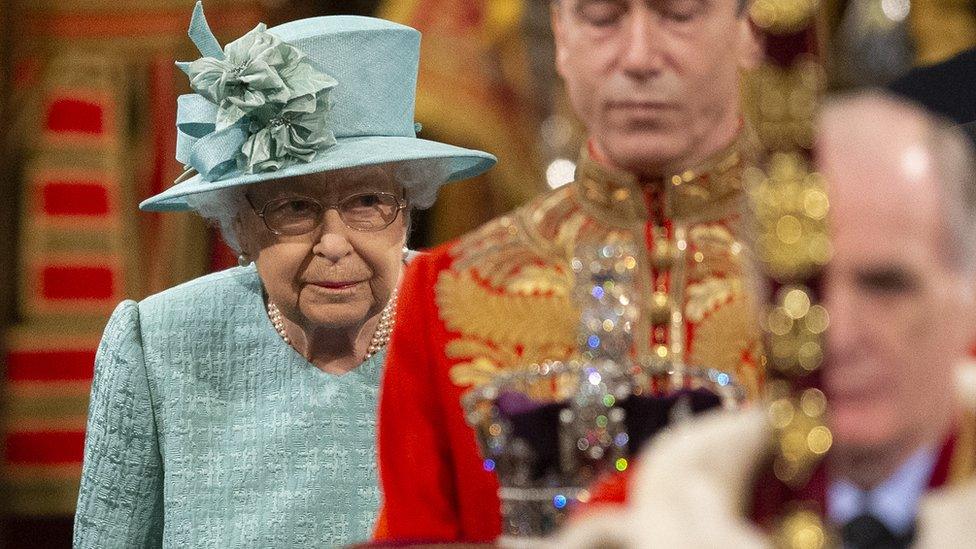Queen's Speech: Our experts react to the government's plans
- Published

The government has laid out its legislative plans for the year in the Queen's Speech. From Brexit to health, trade to the environment, it gives us a sense of what politicians will be debating over the next few months.
Our experts analyse what was, and wasn't, said and what it all means for you.


As well as the withdrawal agreement bill, which will pave the way for the UK's departure from the EU on 31 January, the government will have to pass a series of bills next year in other policy areas as a direct result of Brexit.
Some of them will be major undertakings:
a new way to run agriculture, to replace membership of the Common Agricultural Policy
a fisheries bill to replace the Common Fisheries policy and turn the UK into an independent coastal state
a new immigration system which will treat EU citizens the same as people from elsewhere in the world, once the policy of free movement comes to an end.
There will also be bills covering trade, financial services and cross-border legal disputes.
But passing legislation will be the easy bit - implementing it all will be the big challenge.
New systems will need to be up and running by the end of the post-Brexit transition period in just over a year's time, new staff will have to be trained, and businesses and consumers will have to be ready too.
Civil servants will be under enormous pressure to deliver everything that is required under the tight timetable the government has imposed.


The Ministry of Justice and the Home Office will be among the busiest departments under Boris Johnson's new administration - a reflection of the importance he attaches to law and order.
A number of measures, including those relating to domestic abuse, victims and policing, have been put forward before, but there are also new proposals on sentencing which could lead to a significant increase in the prison population among those jailed for violence, sexual assault and terrorism.
Plans to extend the use of "whole-life" tariffs, where offenders can be ordered to spend the rest of their lives behind bars, are vaguely worded, indicating ministers are open-minded about the range of crimes for which offenders should be locked away for ever.
The idea which has the most potential to alter the criminal justice landscape is for a Royal Commission to examine the process from arrest to sentence. The last time there was such a review was in 1991.
The terms of reference and the chairperson have not been announced - they will be key to understanding which destination the government wishes the commission to steer towards. Interesting times lie ahead.


Environmentalists have welcomed many of the provisions of the new environment bill.
But they point out that ministers are still committed to North Sea drilling, building roads that experts say will generate traffic, and blocking onshore wind power.
They have stayed silent on aviation expansion, and have imposed a moratorium on fracking, rather than the permanent ban which some in the north of England were demanding.
Critics point out that the planned new green watchdog won't have the sort of powers to take legal action that prompted the UK to improve air quality under the threat of fines.


Action on business rates was billed as a measure to "keep town centres vibrant" - but what's on the table for now will only bring limited relief.
Business groups have long been calling for a revamp of the rates system, which raises more than £31bn for the government each year. A quarter of that burden falls on retailers, who pay regardless of profit, says the British Retail Consortium.
So a one-year extension of a discount for some retailers and an extension of the scheme to pubs, music venues and cinemas - with a saving of £320m - may feel tokenistic.
This is especially so as the cancellation of planned corporation tax rate cuts means that business across the country will have to fork out £3.2bn more in bills next year than envisaged prior to the election, rising to more than £6bn by 2024.
For greater relief, retailers will be looking ahead to the Budget and the much-touted overhaul of the rates system. However, it is questionable whether the government will be able to afford to relinquish much of what's become a key revenue raiser.
Meanwhile, both business and the public sector will have to grapple with the government's plans to raise the national living wage to two-thirds median earnings by 2025 (projected to be £10.50), and lower the eligible age for the main rate.
While the plans would in theory benefit more than four million people, alleviating in-work poverty, they have been given a cautious welcome by business groups and low-pay campaigners alike, who urge careful implementation and monitoring.
While the increase in minimum wage to date hasn't had an impact on employment growth, these plans go into uncharted waters - at a time when there are already signs that the hiring spree of recent years is levelling off.


Schools in England are promised more funding, rising by £7.1bn by 2022-23, which the Institute for Fiscal Studies think tank says will reverse the budget cuts of the austerity years.
Minimum levels of per pupil spending are increasing to £5,000 in secondary and £3,750 in primary schools, and then £4,000 in the following year.
Most schools already get significantly more than this - for instance, the average for secondary schools is currently about £6,200 per year and £5,000 in primary.
Only about one in five primary schools and a third of secondary schools are below the proposed new minimum, with the biggest number of these in the South East and South West and the lowest number in London.
But the overall increase should mean an uplift across schools which have been complaining loudly about funding shortages.
So far there is no decision on whether to cut university tuition fees, other than a promise of "better value" for students.


The future of the NHS in England has been put front and centre of the Queen's Speech.
This is understandable given that, behind the scenes, ministers and advisers are saying there has to be an improvement in English NHS performance for the government to keep hold of the voters that backed it at the election.
Ministers are making big play of the extra funding, but experts within the health service have warned even with the above-inflation sums going in, it will take years to turn the NHS around and get it back to where it was a decade ago in terms of waiting times and performance - perhaps even a decade.
The idea of enshrining into law the multi-year NHS funding settlement sounds more significant than it actually is. Ministers want to put a law in place compelling them to keep to their promises, but it makes little difference in reality.
There are also measures promising to make it easier to recruit doctors from abroad, and the government knows it faces a tough task filling the vacancy rates and growing the workforce.
There is little detail about social care - despite Boris Johnson's promise to fix the "crisis" in the system in his first speech as PM.
Instead, he wants to seek cross-party agreement on the way forward - something that is unlikely to happen quickly, given both Labour and the Liberal Democrats have been plunged into leadership races following the election.


There are no big surprises in the busy environmental agenda outlined by the government.
The headline commitment to reduce the UK's carbon emissions to "net zero" by 2050 is there, as are the key elements of an environment bill and new measures on animal welfare. Left unspecified, so far, are the details of many of the initiatives.
A plan to increase the power of local authorities to tackle air pollution makes no mention of whether there's new money to go with it (which is what many councils have been clamouring for).
Campaign promises of new cash for flood defences, electric vehicles, and energy efficiency in homes, schools and hospitals are repeated - a key test will be how they are delivered.
Opposition parties are already saying the government is failing to take the radical action needed.
For ministers, here's a moment of intense scrutiny on the horizon - COP26, the massive UN climate summit planned for Glasgow next November, when the eyes of the world will judge the sincerity of the UK's green ambitions.


The government has announced the first Royal Commission on the criminal justice system since 1991.
The last one met 44 times, took evidence from more than 600 organisations and groups, commissioned 22 research studies and lasted for more than two years.
It was part of a response to the miscarriage of justice cases, which included the Guildford Four and Birmingham Six and led to the establishment of Criminal Cases Review Commission, which investigates miscarriage of justice cases.
These are different times. Many will welcome the new commission addressing the problems of what is widely seen to be a criminal justice system under extreme stress, if not in crisis.
Much of the blame for that is put down to swingeing cuts to the police and Crown Prosecution Service, as well as modern-day challenges such as getting on top of vast amounts of digital evidence obtained from mobile devices.
However, there is real fear that the commission could be a way of kicking immediate and solvable problems into the long grass and delaying across the board investment, which many lawyers see as critical to improving a complex system in its entirety.
- Published17 July 2024

- Published19 December 2019